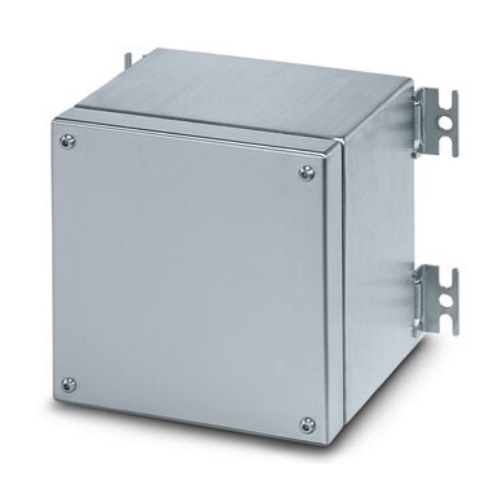Phoenix Contact Stainless Steel Enclosures

Phoenix Contact stainless steel enclosures and junction boxes are engineered to provide reliable protection for electrical and electronic components in harsh industrial environments. Stainless steel construction offers excellent resistance to corrosion, temperature extremes, and mechanical stress, making these enclosures well-suited for demanding indoor and outdoor applications.
Available in a wide range of sizes and configurations, Phoenix Contact stainless steel junction boxes support flexible system design across multiple industries. Enclosures are manufactured using high-quality stainless steel grades, including 304 and 316. Grade 304 stainless steel provides dependable corrosion resistance for general-purpose applications, while 316 stainless steel offers enhanced protection in aggressive environments such as marine, chemical processing, and food and beverage facilities.
Phoenix Contact stainless steel enclosures feature high ingress protection ratings ranging from IP66 to IP69K. These ratings ensure dust-tight sealing and resistance to high-pressure and high-temperature washdown conditions. This level of protection helps maintain system integrity, reduce downtime, and extend equipment service life in challenging operating conditions.
FAQs
Q: Why are stainless steel enclosures used in industrial applications?
Stainless steel enclosures offer strong resistance to corrosion, moisture, temperature fluctuations, and mechanical impact, making them ideal for harsh industrial environments.
Q: What is the difference between 304 and 316 stainless steel enclosures?
304 stainless steel is suitable for most general industrial applications, while 316 stainless steel provides superior corrosion resistance for highly aggressive environments such as marine or chemical processing areas.
Q: What IP ratings are available for Phoenix Contact stainless steel enclosures?
Phoenix Contact stainless steel enclosures are available with IP ratings from IP66 to IP69K, providing protection against dust and high-pressure water exposure.
Q: Are these enclosures suitable for washdown environments?
Yes, enclosures with IP69K ratings are designed to withstand high-pressure washdown, making them suitable for food processing and other hygiene-critical applications.
Q: Do Phoenix Contact stainless steel junction boxes come in different sizes?
Yes, they are available in a variety of sizes and configurations to accommodate different installation and wiring requirements.
Why Buy Phoenix Contact Stainless Steel Enclosures & Junction Boxes from RSP Supply
RSP Supply offers a comprehensive selection of Phoenix Contact stainless steel enclosures and junction boxes for demanding industrial applications. These enclosures provide dependable protection, flexible configuration options, and high ingress protection ratings. Customers rely on RSP Supply for durable industrial enclosure solutions, knowledgeable technical support, and components designed for long-term performance in challenging environments.

